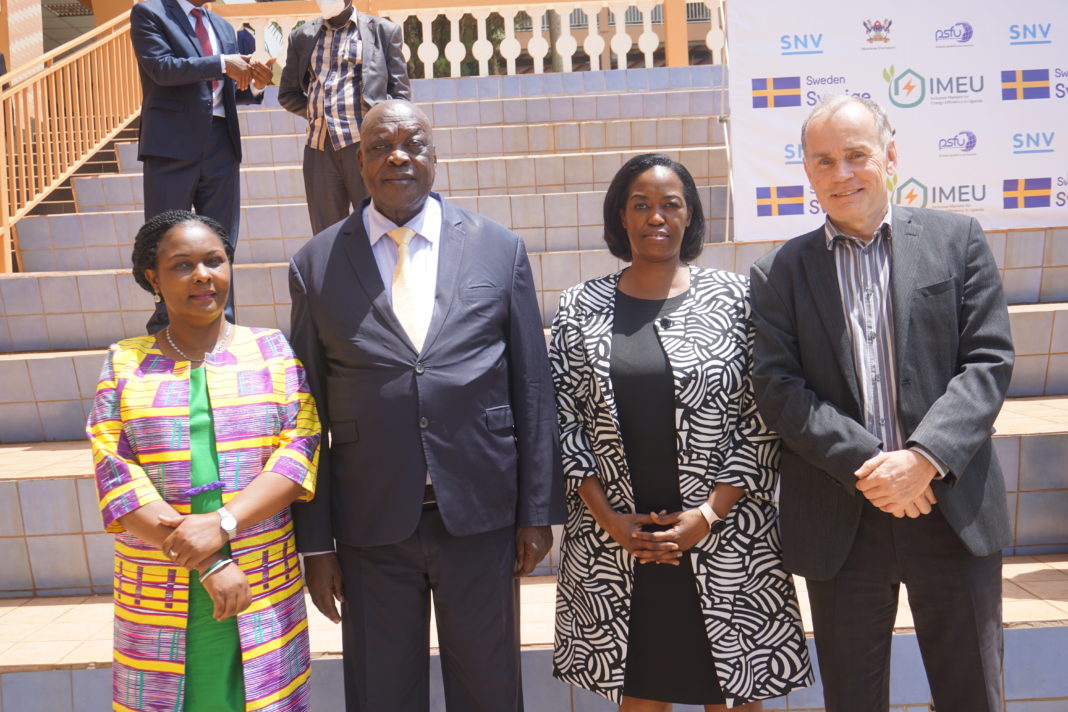Close to 90% of the population in Uganda cooks on open fires or inefficient cookstoves, causing significant health risks, and damage to the climate due to harmful emissions and deforestation. Including energy efficiency in the national planning process could increase energy access to 6 million rural customers and reduce carbon dioxide (CO2) emissions by 10.6 million tonnes by 2030.
While Agriculture contributes 24% to Uganda’s National Gross Domestic Product (GDP), and its growth is projected to increase from 3.8% to 7% in the National Development Plan III (NDPIII), there is little mention of the energy efficiency factor, yet it is a critical element to achieving this growth.
Consequently, to increase the development and adoption of energy-efficient products and services in agriculture and the built environment, SNV Netherlands Development Organisation (SNV) together with the Makerere University College of Engineering, Design, Art, and Technology (CEDAT), and the Private Sector Foundation Uganda (PSFU) have taken a major step to catalyze large-scale action and support needed for the transition to clean, affordable energy for all. Today marks the official launch of the Inclusive Markets for Energy Efficiency in Uganda (IMEU) Project. This launch is a culmination of a long drawn-out process of ideas, concepts, and fund mobilization.
This is a 4-year initiative (2021-2025), funded by Sweden at a total cost of UGX31.8 Billion. This project will be implemented in collaboration with the Ministry of Energy and Mineral Development as the lead Government Institution, as well as other actors in the energy efficiency subsector. The initiative is designed to be as inclusive and extensive as possible so that when the project comes to an end, energy efficiency becomes embedded in everyday life and business activity. Ours is to demonstrate that this is possible, and it works and then the business can run with it.
IMEU interventions will be embedded in two sectors namely: Agriculture and the Built Environment. Their selection was based on the potential and opportunities that these two sectors present in terms of enhancing energy efficiency towards improved productivity, competitiveness, and resilience.
The Project will adopt a “Triple-Helix model” as its implementation model, which will involve key stakeholders from policymakers, the private sector and industry, academia, and civil society. The co-production used in the “Triple-Helix model” will address the limitation of feedback mechanisms in production and the use of knowledge to address societal challenges.
This approach also provides additional co-benefits to increase trust and social capital, both of which are important factors that can promote growth and contribute to improved governance.
SNV will lead project implementation, Makerere University (CEDAT) will take the lead on research, and PSFU will represent the voice of private sector actors.
“Let us all embrace energy efficiency as an integrated cost-effective option to achieving an inclusive low carbon and climate resilient development that supports people and businesses to thrive in a changing climate world,” says Phomolo Maphosa, Country Director, SNV Uganda.
“To increase access to clean and reliable energy in Uganda, it is important to have a holistic approach and to involve stakeholders at every level. We are pleased to support a project that brings a variety of actors together, actors that share a common objective, namely, to ensure energy is used more efficiently by small- and large-scale consumers alike,” says Ola Hällgren, the Head of Cooperation at the Embassy of Sweden.
During the 4 years, IMEU plans to directly benefit 30,000 households, 328 SMEs, 52 Social Institutions, and 15 Energy Service Companies. Indirectly, we expect that at least 450,000 individuals will be positively impacted by the Project.
The key target areas are the agricultural (focus on agribusinesses and farmers’ cooperatives) and built environment (focus on households, businesses, and institutions), including selected value chains (dairy, tea, cereals, oil crops, horticulture) in different Agricultural Ecological Zones, rural communities, and cities.
IMEU will contribute to climate resilience and mitigation, the competitiveness of businesses, and the reduction of health risks in the built environment and agribusiness, by focusing on Increasing demand for energy-efficient products and services, Strengthening the supply of energy-efficient products and services to support SMEs and Strengthening knowledge, coordination, and the policy environment (enabling environment).
Direct beneficiaries of the project include Energy Service Companies (ESCOs) and Small and Medium-Scale Enterprises (SMEs) that supply energy efficiency products and services, households, institutions, (agri) businesses and cooperatives, women, and financial institutions. Indirect beneficiaries are smallholder farmers (to be reached through agribusinesses and cooperatives), and additional households, businesses, and institutions.
To achieve sustained impact, IMEU will deploy a well-balanced mix of financial and technical support to the energy efficiency markets through the project’s core component known as the Market Development Fund (MDF).
The Market Development Fund is a €2.1 million (UGX 7.8 Billion) Funding Facility aimed at piloting innovative models for supplying and adopting energy-efficient technologies and services; as well as growing and attracting private capital for sustained impact beyond the project period, which will run until November 2025.







